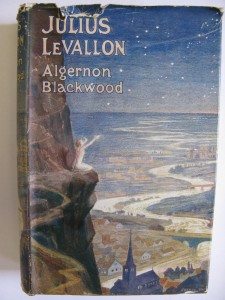I’m partial to an unusual tale, and thus, I suppose, was bound to get caught in the tendrils of H.P. Lovecraft sooner or later. An oft cited influence on the modern in his own right, this premier auteur of strange fiction was concious of the debt he owed to his predecessors in the field (many of whom haunt the Tower), and it is from this jumping off point (a plunge from the shore’s of Atlantis into the mythos infested waters that surround it) that I’d like, if I may, to borrow some time to post a blog or two flagging some of these influences and having a chin-wag about the subject in general.
To kick off then…
If the dominant style for fiction during the first decades of the twentieth century appears to have been a continuation of the literary realism of the Victorian era (that of Dickens, George Eliot and Balzac, continued by Arnold Bennett, Ford Madox Ford, D. H. Lawrence … et. al.), there is, if one is willing to look at it, a concomitant rise in the amount of fiction being written in a more fantastical mode; the stories of the weird and wonderful taking place in this, and other worlds.

Julius Le Vallon (1916) / by Algernon Blackwood
…A prolific writer of strange fiction, penning 15 books in his most productive period from 1906-1916, his stories present their protagonists as seekers of the unknown, rather than the passive receivers of apparitions, whose investigations culminate in awe and wonder (The Centaur, 1911) as often as they would in horror (The Empty House and other Ghost Stories, 1906). Raised by a strictly Evangelical father, he would eventually rebel against these teachings and immerse himself in whorls of Buddhism and Rosicrucianism. Although a firm believer in psychic experiences and supernatural phenomena, all the same, he never presented his stories as coming from his own experience.
Coming up next time: A man with a very long name…


From the book on my desk right now: “What has risen may sink, and what has sunk may rise. Loathsomeness waits and dreams in the deep, and decay spreads over the tottering cities of men.” (Lovecraft himself, about the horrors that will come when Cthulu returns).
I love the way that horror fiction of the early 20th century seems to always focus on a level-headed rationalist who has grudgingly been brought to believe in the existence of The Other.